This is the second part of the interview. Read the first part: We need political artistes: TM Krishna
Poramboke Song
Your journeys are always on unbeaten tracks, like the music festival at Urur Olakkot Kuppam in Besant Nagar. And the Poramboke Paadal was another musical intervention to protest against the chemical waste deposit and pollution in Ennore creek. Are you ready for one such Poramboke Paadal in Kerala?
I'm open to doing a Malayalam Poramboke. But I need somebody to write in colloquial Malayalam. Poramboke song is very interesting in many ways. One is that it raises some issues of environmental disaster in the north of Chennai. It addresses the horrible situation. As I'm talking to you here now, the pipelines are pouring fly ash into those lands, making it toxic. People get deadly diseases. The river is black. Sky is black. The scenes are horrible. It is the first time that an elite art form got married to local language. These things usually don't come together. The Carnatic/classic is in one direction and the local Chennai dialect is in another direction. Even many people in Chennai consider local dialect as something below the standard. But that's not the fact. It is a beautiful dialect. It has Urudu in it, Telugu in it and English in it. It is the dialect prevalent among the local communities of a cosmopolitan city. And it was for the first time that this language was used for a Carnatic composition. It was an interesting experiment. I think it worked. It was received so well. It opens multiple possibilities.
So I'm open to singing a Poramboke song in Malayalam. But I will insist that it should be in local Malayalam. It should not be the Sanskritized literary Malayalam. If somebody can write such a song and send it to me. The song can be about a local issue. Write about a local problem in local language and T.M. Krishna will be happy to sing it.
That'll be wonderful... Just a while ago you surprised us all with a rendition of a Malayalam song during the concert. We never knew Kerala Varma Valiya Koyi Thampuran's Mayoora Sandesham - the famous Malayalam poem written in the model of Kalidasa's Meghasandesham - was transformed into a Carnatic composition!
That was the song I tuned many years ago. I hadn't sung it for years. This evening I remembered it and you must have seen me on stage searching for it in the notebook. It is tuned in Khamas raaga. Sangeetha (Krishna's wife Sangeetha Sivakumar) composed the music. I found the lines very interesting. It is a song on Trivandrum (Thiruvananthapuram). It describes the many scenes there - the Palayam mosque, hospital, railway station, all the Brahmins having food during lunch time...
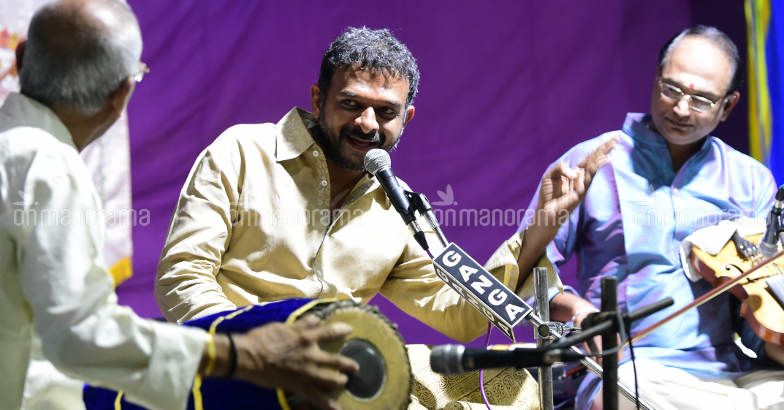 TM Krishna. Photo: Jibin J Chempola
TM Krishna. Photo: Jibin J ChempolaBut, how did you fly past the Malayalam poem?
There's one side of me which is a Malayali. Many people do not know that I have Malayali roots. My mother's mother is from Vadakkumthara in Palakkad. My mother's father is from Neyyattinkara. Thus I have a strong Kerala connection. I can understand Malayalam because I travel in Kerala; but I cannot speak Malayalam. My grandmother had come to Chennai and settled down there. She did her studies in Chennai.
Mayoora Sandesham, the poem was given to me by my uncle - my mother's sister's husband. I sang it in a concert many years ago at Jaya TV's Margazhi festival. A controversy erupted a few months prior to this concert when I made the statement that singing on coca cola or Rama is the same. It became a big controversy and people got upset. So I decided that I should be doing something for that concert at Margazhy festival. Usually there is particular topic for each concert. I told the organizers that I would forgo the practice of announcing the topic in the beginning of the program and ask the audience to guess it at the end. I sang a range of compositions including Mayoora Sandesham. And when I asked the audience to guess the topic, they failed to give the right answer. My topic was bhakti, devotion. Bhakti has got nothing to do with Rama or Krishna or Jesus. Bhakti is the spirit to surrender to something. You can surrender to anything. When I surrender myself to music, it is devotion. This photographer can surrender himself to photography. Anything or anybody can be the subject for devotion. It needn't necessarily be God.
I was looking for a Malayalam song for the concert featuring bhakti. And my uncle helped me with Mayoora Sandesham. He narrated the story of Kerala Varma Valiya Koyi Thampuran. He explained that Thampuran was briefly imprisoned after he incurred the wrath of the king and that Mayoora Sandesham refers to the hard times of exile. My uncle himself selected verses, picked the lines for the composition I wanted. Then he sent the song to me asking: Krishna, can you sing this?
It was after so many years that I sang it this evening. Now that I revived it, I shall surely sing it more often. It is a beautiful song. A bird's eye view of the city.
Whatever be the logic of sending a peacock to Thiruvananthapuram as messenger, many descriptions in the song are absolutely stunning.
Yes. I thought it important to have a Carnatic song fashioned in this model. After all, what's wrong in using such descriptions in a Carnatic composition? Description of a city like Thiruvananthapuram; the sights it host. It is a very real local theme. There's no God there, but devotion. There are a lot of possibilities when we keep an open mind.
That's true, but do you believe in God? Any favorite deity?
My deity? None! You know, I always believe in the fact that we are all floaters. We float from believing to not believing. Suddenly again we believe, again quit it... We do not stand firm anywhere.
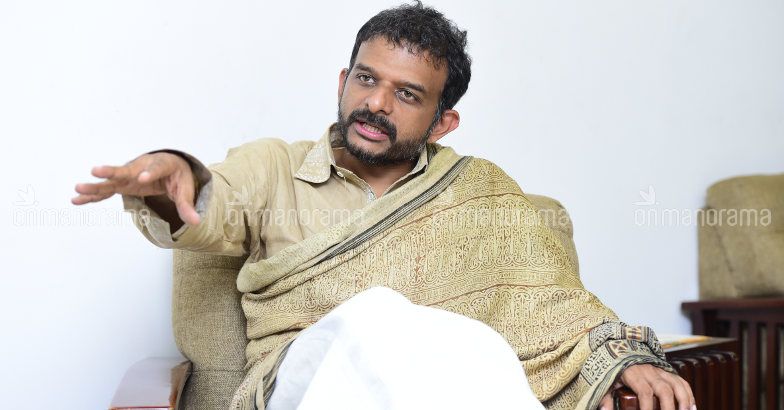 TM Krishna. Photo: Jibin J Chempola
TM Krishna. Photo: Jibin J ChempolaSo you mean to say that you do not have Lord Krishna in mind when you render Krishna nee begane...?
No, I don't call Krishna the deity when I sing that composition. I call the musical sounds in the word Krishna, the musical flow of it. I'm not calling Krishna, no images come to my mind, but the movement of the sounds in the word Krishna. I'm concerned only about the music in it. It is the music of sound and language. Every language is musical. Consonants and vowels and all. I may not understand a word, but I can still say it's beautiful. One can feel the music in a word even if one fails to understand its meaning.
Your passion for mountaineering is amazing. Interesting to imagine Krishna singing in the Himalayas.
In the Himalayas I'm more of a climber than a singer. But I can say that I have sung everywhere, I've sung on every mountain. I've sung on every mountain top. I do trek but I enjoy doing once-in-a-year mountaineering. Not just the Himalayas, but all over the world. I reached the summits of around three mountains including the one in Ladakh. I've climbed in South America and Russia. Last year when the Magsaysay award was announced, I was in the high base camp in Russia.
Do you still get time to watch cricket?
I watched the recent India-Australia test match on television. It was after a long period that I could find some time. But I should say IPL killed my passion for cricket. May be I've aged and that's the problem. I grew up with test cricket.
Krishna used to keep pager in front to know cricket score during concerts!
Oh! All that was in the past. One shouldn't do it. Too bad. That pager incident was when the World Cup was going on. Score arrived on pager. I would take a look at it while singing. I was young. What crazy things we do when we are young. No more pager business anyway!
But you do more crazy things now than in those young days.
Yes, that's also right. I have also written about cricket. About the aesthetics of cricket.
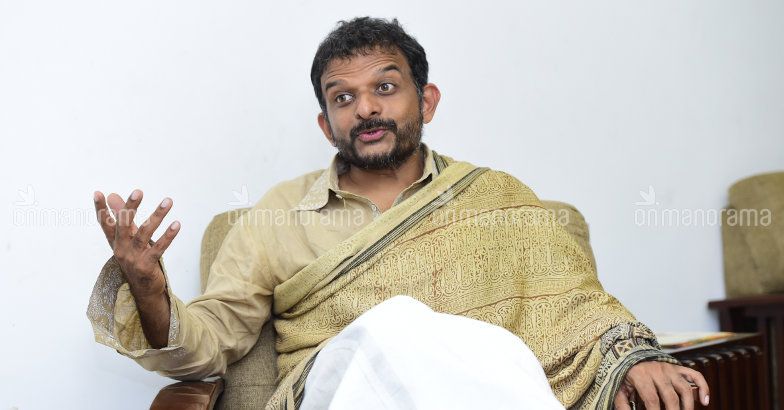 TM Krishna. Photo: Jibin J Chempola
TM Krishna. Photo: Jibin J ChempolaPlease tell us about your parents.
My mother Prema Rangachary runs Vidyavanam, a tribal school in Aanakkatti, near Palakkad. She lives there as well. It's an incredible school. It's a questioning kind of education, very open and free. My mother is an extraordinary personality. She's 74. If you meet my mother, you will know why I'm like this. She started this school after thinking - why are the tribal children not lucky of an education that my children were fortunate to have? Why should they compromise on education?
My father is no more. He was a good reader and a good thinker. He passed away before the transformation of T.M. Krishna. I sometimes miss him because if he were alive, we would have very interesting conversations. He may not agree with me completely, but still the debates would be endearing. He loved active conversations and open discussions. He would go into the small crevices of a problem, analyze it and give an opinion. He was a voracious reader. He used to wake up at four in the morning and start reading. An incredible personality. If he were alive today we would have some terrific conversations. Unfortunately he passed away before, like I said, T.M. Krishna changed. He was a lovely man, very very soft in nature. He was not like me. Very gentle and generous, very giving. I haven't seen anybody giving like my father. If somebody visiting us made some good comments on something in our house, that object would reach his house the very next day. My father took pleasure in gifting things.
Just like the late Madhavikutty (Kamala Das). If someone made some good comments on the golden bangle the writer was wearing, she would immediately take it off and gift it to that person.
Exactly. Same nature. Will part with anything without a second thought. I haven't got that quality.
Have you inherited your father's reading habit.
I started reading very late. Initially, I never liked reading books. My mother used to get fed up trying to make me read. People mistake me for a great reader. No, I'm not.
It's quite natural for people to think so about someone who has written books including the one on the history of Carnatic music.
That's right. But I shall explain. I started reading books seriously only recently. I prefer non-fiction. I mostly read non-fiction like philosophy, politics and social issues. Sometimes I read at random, meaning I pick up from here and there. However, I manage to get what I need from it. This kind of erratic reading suits my character as well.
There is beautiful article on you by S. Gopalakrishnan. In it he mentions the touching incident of Kathakali historian Killimangalam Vasudevan Namboodiripad on his death bed, longing to listen to your Neelambari.
Oh, that's something I didn't know about.
It was in 2014 December. The great classical scholar chose your music in his last moments. It's worth thinking why even the classical, traditional people love to hear the rebel that is T.M. Krishna.
Well, in reality, who's the rebel, who's the traditional? These are terms we give to satisfy ourselves. You call me rebel because you want to feel comfortable with that. Whether we are rebels, whether we are not rebels... these factors are immaterial. I could say I'm a traditionalist in many ways. It all depends on how you look at these things. Am I a questioning type of person? Of course I am. I'm willing to debate. And I don't think they are trivial questions. They are important ones. So, if anybody wants to think that they are trivial, I've nothing to say about it. All are welcome to disagree with those questions; that's fine. Actually, by calling me rebel, you are able to evade those questions. You are trying to find a way to be safe. These questions are what I'm asking myself. Because I've all these problems within me. I'm not devoid of these problems. I recognize that fact. It's important that we all recognize that. Whether one is a Brahmin or Dalit, everyone should recognize the existence of these issues. And we all have to deal with the context where all these problems erupt. We all have to talk; we all have to change; we all have to challenge; we all have to be sensitive. Everyone should know under what circumstances these issues have been born. There should be discussions. We should talk frankly. We have to change. We have to challenge. We have to respect feelings.
There's another observation on Krishna's unusual personality - that you are the child of Emergency. Also that there are no historical records on how the musicians in Chennai reacted to Emergency.
Oh that's right, I was born in January 1976 when Emergency was in force. The child of Emergency! Okay; I never thought about it from that point of view. Thanks.
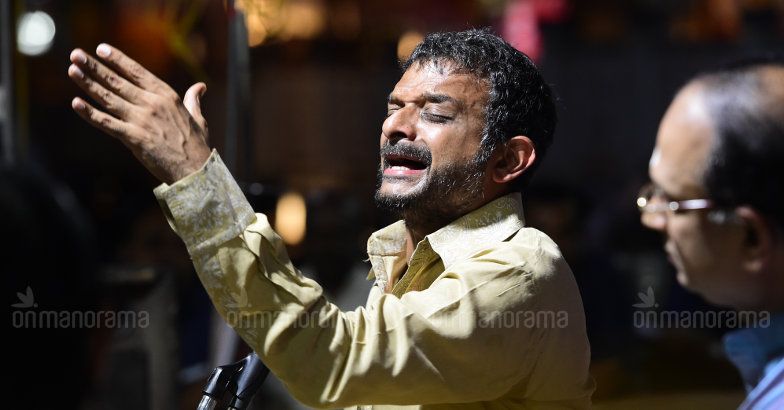 TM Krishna. Photo: Jibin J Chempola
TM Krishna. Photo: Jibin J ChempolaThe world of Carnatic music has got many figures like Neyyattinkara Vasudevan who were severely discriminated against.
Neyyattinkara Vasudevan was one of the best musicians Kerala ever had. My feeling is that he never got his due. Not just from his place of origin, but also from the whole world of Carnatic music. From Chennai, he was completely denied what he truly deserved. I can say this aloud anywhere with 100% certainty. He did come to Chennai and sang once in a while. But that is not what one should take into account. You cannot say that he got recognition by pointing out the cases of a few concerts. That's not how you respect a person. Neyyattinkara Vasudevan deserves to be remembered as one of the greats in Carnatic music. He was a very sensitive musician. That kind of sensitivity is rarely seen in Carnatic music. I have listened to his concerts sitting on the stage at Music Academy dais. And the charm of the Panthuvaraali raaga he sang there! I still remember that Panthuvaraali. Unfortunately the world of Carnatic music all over did not give him his due. He is one among many other people who had the same fate: Rajaratinam Pillai, Madurai Somu... You may not be able to go back in past and correct it. Fine: but if you can acknowledge it, if you can be honest enough to acknowledge the problem, acknowledge that something wrong is happening, that is enough! That will take us forward. If you are going to hide everything you will keep on saying that all is well and perfect.
What about the female presence in Carnatic music? It's mostly women who handle the thamburu in concerts. Sometimes they look like just show pieces...
That's an interesting observation, though not entirely true. I had never thought of it from that point of view. Now that you have pointed it out, I should give it a thought. In my concerts my disciples play thamburu. Sometimes boy students, sometime girl students. So, men also play the thamburu, not just women.
Yes that's true, I have seen on You Tube a foreign gentleman playing the thamburu at T. Vrinda's concert.
That was a concert in Washington. So if you ask whether there is any patriarchy in the selection of Tambura artists in Carnatic music, well, I don't think there is. But your observation deserves to be thought about. There is one thing: forget thamburu: there is a certain patriarchal conditioning on how a woman appear on stage. On the world of Carnatic music, there is a mind set of how a lady should be dressed - the jewelry, saree, flowers... There is a whole set of requirements which come from patriarchy.
How does your wife, Sangeetha, who is a Carnatic musician respond to this patriarchal conditioning? Does she follow these stipulations without any objection.
Sangeetha is very much bothered about this fact. We have had many discussions on this topic. She is definitely distressed about stipulations that a woman on the stage has to dress up in a particular way. And she tries to change it. That is a battle that she too is fighting. This is bluntly sexist. Not just in Carnatic music, but society at large believes there are certain stipulations regarding how a woman should dress. Men can get away with anything! There is patriarchy in society and it is also present in music. Kancheepuram saree, jewelry code. At least some women are trying to change it. They are trying to question it and challenge it, but it will take a lot of time before some change happens.


























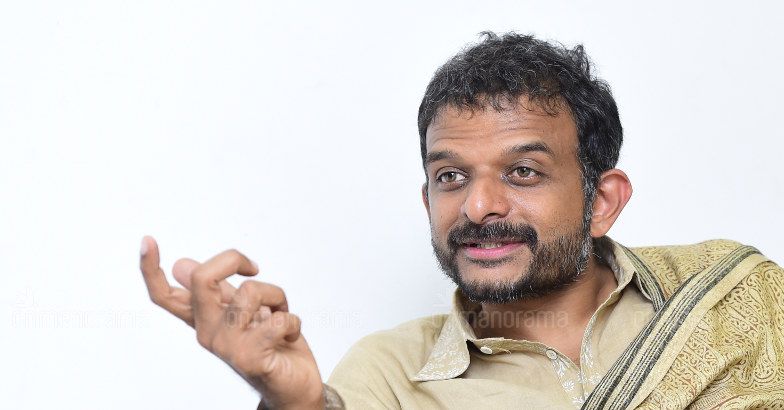 TM Krishna. Photo: Jibin J Chempola
TM Krishna. Photo: Jibin J Chempola